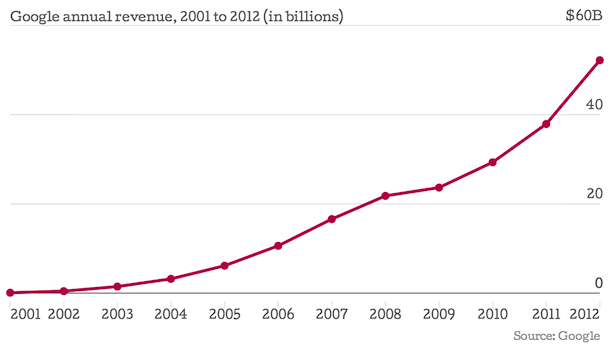Chapter 12
Google, The Second Coming

Indeed, what turns out to have been the extraordinary ambition of Google — and its ability to deliver on that ambition — ends up coloring much of what happened to the news business between the Web Winter and today. That era can just as easily be called the Age of Google as anything.
Google began with a decidedly un-media company idea, creating a search algorithm that would “purify” the quest to find whatever you were looking for on the Internet without applying individual human judgment. Yet Google quickly evolved into the ultimate media company and has proved to be the ultimate disruptive innovator (so far) of a multitude of businesses. But above all else, it completely turned the advertising business on its head, beginning with the notion that Google didn’t want you to come to its site and stay there; it just wanted you to go through it to get everywhere else. And then it wanted to charge marketers for the privilege of following you where you were going, and knowing what you went there for, and then selling them the ability to advertise to you.
“Paid search” is the understated name given to its main business concept, which Google didn’t invent but worked hard to optimize. Then again, that’s a bit like saying that Sam Walton didn’t invent discount retailing, but merely made the most of it with a modest chain of stores. Google wasn’t the first search site to present paid results: that was invented during the dot-com boom by an entrepreneur named Bill Gross, who created a sponsored search engine called goto.com that eventually became Overture and was later bought by Yahoo. But Yahoo wasn’t able to swim fast enough to catch Google, and Google rapidly gained market dominance after it got started. Google called its service Adwords, which are those small text ads that show up next to the search results you’re looking for whenever you type something into a Google search box and click “enter.”
Google CEO Eric Schmidt has a pretty simple explanation for what actually makes his fairly complicated company click, and it’s the same thing that used to make all those news companies so profitable: a river of advertising dollars.
Google today is pretty much the same as it has been since I’ve been here. Since 2001, the majority — 97%, 98% — of our revenue comes from ads of one kind or another. These little ads that come along with our search results, which are targeted to what you were looking for, people auction and people click on them, and we make a lot of money from that, and we do it globally, and it works extremely well. That’s not changed very much, and I don’t think it will change very much in the next while.
Today, with digital advertising revenues in excess of $40 billion annually, Google’s share of the digital advertising market dwarfs all others. Sir Martin Sorrell, CEO of global advertising giant WPP, says that Google has become his firm’s number-one spending destination. The search company supplanted leader News Corp. and its global empire of media brands, everything from The Wall Street Journal to Fox News and The New York Post to American Idol. It was Sorrell who first referred to Google as his “frenemy”: at once, both friend and enemy. The same word is now often applied in a news context, as Google is a vital provider of traffic and revenue to news sites, while at the same time it systematically and voraciously feeds on their revenue streams. And while Google may want to be known for its “Don’t be evil” credo, Sorrell captured well the business impact of what they really do:
But if you thought about what was their principal operating principle, it would be disintermediation of established business models and providing you and I as consumer with a cheaper alternative, a better-value alternative… In a way, I think this is an industrial revolution that probably, for legacy companies, is very difficult to deal with.

As he had in the early days of Yahoo, Mike Moritz of Sequoia became an early backer of Google.
The Google investment wasn’t centered around media. It wasn’t centered around news and information. It was centered around technology. The obvious point that the power of the search technology that the founders of Google and their close friends had worked on [was] superior to everything else that was around.
But you saw it early on as an advertising play, right? Or not?
Initially, Google was going to be a licensing company to…
It was. It was licensing to Yahoo.
That was part of the way that Sequoia got involved with Google. Google was licensing its search technology to Yahoo for Yahoo to distribute.
When and how does the advertising light bulb go off? Is Sequoia involved in that?
The advertising light bulb went off very early in a tiny way at Yahoo. The first advertisement, I think, was a tiny, inconspicuous Visa advertisement, which provoked all manner of hand wringing within Yahoo…. There was an enormous fear that we were selling out to the demons, that this service on the Internet was going to be perverted and spiral downhill into the clammy hands of the capitalists. There were all these outraged emails from the devoted that there was this little Visa advertisement.
Of course, it played out that Yahoo got over its squeamishness about running online ads pretty quickly and became the dominant Internet media company of its moment — but then lost its lead to Google and has been playing from behind ever since.
…It’s simple mathematics. If you got the best algorithms, you wring most of the cost out of the aggregation business that you’re in. Here’s Yahoo, clunking along with all those human beings, trying to aggregate information, and here’s Google.
Google’s architecture, the way they launched anything new, was stunning. We didn’t know it quite at the time, but it didn’t take us long to figure it out. They set up the company with a vision that everything we do, we can do, if we press one button here in [Silicon] Valley, it can roll out worldwide, instantaneously. Think of what kind of architecture it would take to do that. Among other things, they had strapped together these very cheap servers by the hundreds of thousands, literally. It’s the software that interconnected them that was brilliant. People forget that the architecture…of how the data flows, really matters.
Again, back to the point about speed. Like [at] Yahoo we’d have a [new product, take, for example] Yahoo Answers. We’d have a product developed by a small team in Taiwan or Korea.
[A] successful product, by the way.
Yeah, fine. But first of all, look how long it took just to get headquarters to understand that it was successful, much less roll it out anywhere. Versus Google, who could have taken something like that and rolled it out instantaneously. I remember asking one of our engineers, “When we’re doing testing, how many servers do we dedicate to that task?” Proudly, he said, “5,000.” I said, “How many does Google use?” He said, “At least 100,000. Maybe 150,000.” Think of an exponential curve, and think about our line versus theirs and how long it would take for them to zoom past us. Back to search, everything that they did was architected for speed and simplicity. They made it look simple, but they had the best algorithms, by far. That meant that they would be more accurate, they’d be more timely. In making the advertising case, it’s the same for the ads. They would be placed in the best context.